Investments in Croatia: Cash for Health and Education Sectors Continue
Investments in Croatia come in various forms, and while we tend to read about either investors running for the hills when faced with Croatia's draconian love of red tape, or investments being made in the tourism sector along the coast, large sums of cash are continually being poured into both the healthcare and the education sectors, with one county standing out from the crowd.
As Poslovni Dnevnik writes on the 10th of January, 2019, as much as 10.5 million kuna has been invested in school renovations in Koprivnica-Križevci County, the co-financing of school transport, and the largest number of scholarships have been secured so far. One of the priorities of Koprivnica-Križevci County, which was defined in the county's development strategy, is constant investment in education that continued throughout 2018.
In addition to the large amount of money having been invested in school renovations, two capital projects for energy reconstruction are due to be set up. The involved schools are primary schools in Virje and Drnje, these projects are worth as much as 9 million kuna, and both schools will achieve heating savings of a massive 70 percent. Given the fact that the aforementioned county has recognised the importance of investing in energy efficiency, new contracts have been signed for the development of major energy renewal projects in Novigrad Podravski, Ferdinandovac, Đelekovec, and Veliki Poganac.
These investments in Croatia are more than praiseworthy, and in addition to improving the overall material conditions in schools, the county is continuing to co-finance student transport and support projects for students with disabilities and special needs, offering free school meals for students from less wealthy backgrounds, and more. In addition, last year the largest number of student scholarships was awarded to date, up to 35 of them, including those awarded to medical students, which is an important contribution to the project of the promotion of vocational professions.
Despite all of the above, 2018 will most likely be remembered for investments made in the health sector, and thanks to the joint cooperation of the county, the head of Koprivnica hospital and the parliamentary representatives with the Minister of Health, a long-awaited 10 million kuna magnetic resonance (MR) device arrived at Koprivnica hospital. Other capital projects include the very welcome eight-million-kuna "POZDRAV - Improvement of Primary Health Care in Koprivnica-Križevci County" initiative.
Make sure to stay up to date with investments in Croatia and much, much more by following our dedicated lifestyle and business pages.
Croatian Students in the UK Increase Following Country’s Accession to EU
As of 2016/17, there were 770 Croatian students attending university in the United Kingdom, a figure which is over three times higher than three years before when just 255 Croats were studying in the United Kingdom.
Despite the fact that the international application and enrollment load has been flattened in recent years when it comes to the UK’s higher education system, the number of talented foreign students willing to get a British degree remains high. Moreover, there are students coming from particular countries who, over the past few years have intensified their presence within British universities.
Shedding light on official statistics, Studying-in-UK.org revealed that Croatian students are in that category. Following their country’s accession to the European Union back in 2013, the number of Croatian students attending UK universities increased largely on a year-on-year basis.
According to these statistics, last year, British universities were home to 770 Croatian citizens, which, when compared to three years previously, was more than three times higher.
Statistics from 2013/14, on the other hand, show that during that year there were 255 Croatians enrolled in UK universities. Moreover, in the previous year, there was not a single Croatian citizen studying in the UK.
Universities in England are home to the majority of these students. Out of 770 Croatian students in the UK, 645 of them were attending an English university as opposed to 85 students in Scotland, and 40 students in Wales. In Northern Ireland, on the other hand, there were only five Croatian students attending university who were enrolled during the 2015/16 academic year.
The number of Croatian students in British universities by constituent country (Northern Ireland, England, Scotland, Wales) over the past several years is shown on the table below for the time period 2013/14 – 2016/17.

Make sure to follow our dedicated lifestyle page for more.
Croatian Aviation Student Team Best in World at Aircraft Projection
An absolutely incredible achievement for the Croatian aviation student team of the Faculty of Mechanical Engineering and Shipbuilding has been secured with their outstanding success at an international competition organised by the American Institute of Aeronautics and Astronauts (AIAA).
Croatia may not have many inhabitants, and with the number worryingly dwindling day by day with the mass emigration of the population to pastures new, there might not be a lot to smile about for many. Despite this, this small country with a population numbering just a few million continues to breed some of the most impressive and talented people across all fields, from sport to technology and innovation, to cuisine.
As Vijesti.rtl.hr writes on the 3rd of December, 2018, the ten-member team came first place in the category of team projects by graduate students. Srednja.hr reports that their next goal is to present the project to all interested parties in order to popularise the faculty and that particular field of study.
The Croatian aviation student team consists of Fran Delić, Tibor Gašparac, Antonio Golub, Antonio Jurišić, Antonio Klasnić, Ivan Kovačević, Matea Lišnić, Kristijan Ruklić, and Vjekoslav Sraga, and all of them participated in the construction of the best project under the watchful eyes of their mentors dr. sc. Milan Vrdoljak and doc. dr. sc. Pero Prebeg.
Within the conceptual design of the aircraft, they formed their main parts such as the wings, the body, the chassis and drive, in accordance with the goals they set themselves as well as the requirements of the MIL standard and the project task.
Their impressive victory is a huge success in the global context, as the competition is announced by the largest aviation organisation with more than 80,000 members and which publishes dozens of professional aviation magazines. From the Croatian perspective, the team's success is an even greater one.
Except for the aforementioned Croatian aviation student team, only two other teams from Europe won at this competition - and they were teams from the prestigious universities of TU Delft and the Polytechnique University of Milan in Italy.
Make sure to stay up to date with our dedicated lifestyle and Made in Croatia pages for much more.
Carlsberg Croatia Signs Cooperation Agreement with Croatian University
An unusual but excellent agreement on cooperation signed between one Croatian university and Carlsberg Croatia is set to bring students closer to their potential employers, and connect theory and practice to help keep young people in Koprivnica.
As Poslovni Dnevnik writes on the 16th of November, 2018, on Wednesday, November the 14th, 2018, a press conference was held at the North University at the University Centre in Koprivnica, where the signing of a cooperation agreement between the Koprivnica educational facility and no less than Carlsberg Croatia was held. The press conference was attended by Helle M. Petersen, the president of Carlsberg Croatia's management board, dr. sc. Mario Tomiša, the vice president of the Koprivnica University Centre, associate professor. dr. sc. Vlado Tropša, the vice chancellor for teaching and student affairs, as well as other heads of study programs of the aforementioned University.
With signing the said cooperation agreement, a period begins in which students and the Koprivnica brewery (part of the Danish Carlsberg Group) are expected to find ways to work together. Student practices, the visiting of various experts from Carlsberg at the university, as well as connecting through other projects will be mutually beneficial.
Helle M. Petersen, CEO of Carlsberg Croatia, noted during the introductory part of the conference: "The collaboration of the economy and educational institutions is the only safe way for the whole society to progress. Koprivnica is a wonderful place to live, with many advantages offered by its residents, and for young people to remain here we need to connect a professional perspective to it, too. At Carlsberg, we're proud that we've always been a learning organisation and have been developing our people, and that's why we want young people to recognise the benefits of working in an international environment, a company that deals with such a passionate and interesting thing, as is beer production.''
Assoc. prof. dr. sc. Mario Tomiša emphasised that this cooperation will strengthen the link between Koprivnica and international companies: "Koprivnica is a small town, and we who were born here have been living with Carlsberg since our youth, our family, friends and our associates work there, the Carlsberg connection is a long-standing and powerful one, and North University wants this link to be deepened even further, to the satisfaction of all three sides.''
During the conference, Tomiša emphasised that the agreement encompasses cooperation on scientific research and professional projects, cooperation on teaching at the university in question, as well as in the development of knowledge, skills and competences of students.
"We're happy that Carlsberg Croatia has recognised the quality of our studies and has decided to support us in an effort to provide students with more through their studies. Lifelong education, programs which connect theory and practice, and connecting students with their potential employers; these are all areas in which the university has impressive results. This year, the university opened up a new undergraduate degree in Food Technology, and in the second and third year, we focus on beer production. Today, we have 27 study programs at the university, so we can cooperate with Carlsberg on a series of other directions such as economic and technical logistics, sustainable mobility and logistics, media design, business, and management,'' concluded Tomiša.
Want to keep up with more news like this? Make sure to follow our lifestyle page.
Stem Revolution for Croatian Schools: Programming with Micro:Bits
The stem revolution for Croatian schools has begun for children in grades 1-4!
Zagreb, November 6, 2018 - Elementary schools across the whole of Croatia as can apply for participation in the new STEM Revolution – Grades 1- 4 project. Those participating will have the opportunity to teach their youngest pupils digital literacy competencies and learn programming using micro:bits.
The project was presented by Nenad Bakic, the President of the Institute for Youth Development and Innovation (IRIM). During the last year, project STEM revolution introduced programming into the wider education system, with a donation of 25,000 micro:bit microcomputers into 1000 institutions.
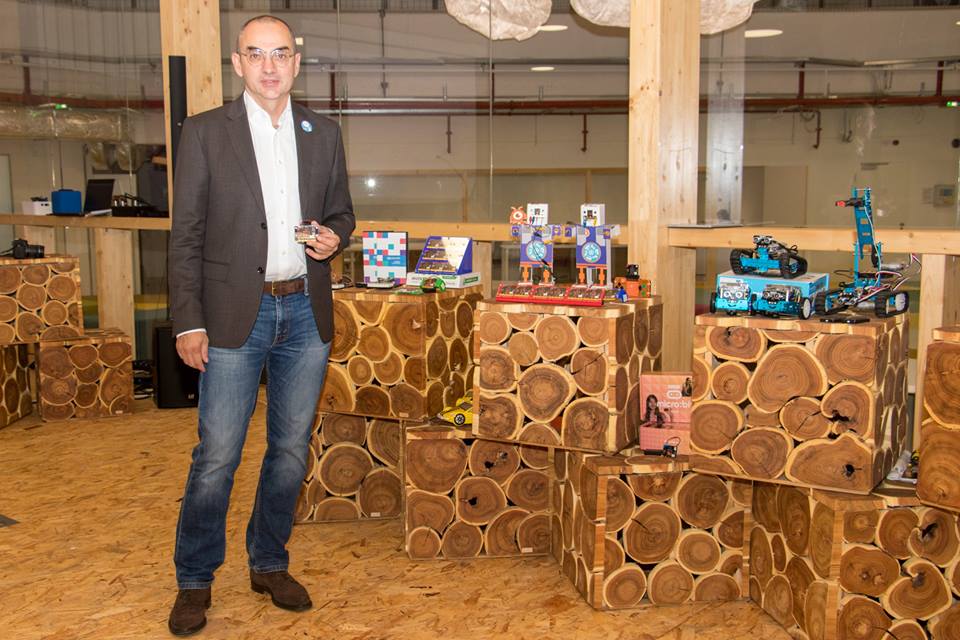
In cooperation with the Ministry of Science and Education, the Croatian Employers Association, CARNet and other partners through the ProMikro project IRIM, programming in the 6th grade with over 35,000 donated micro:bits was introducted, was well as content development and education of over 2000 teachers.
''There is a strong interest in Croatian educational system for the introduction of STEM competencies, especially in relation to technology. This can be seen in advanced activities, for example, through the ever-growing interest in the Croatian Makers Robotics League, which now includes over 550 educational institutions, but equally at the widest level of digital competence development, i.e. programming and the development of digital literacy, through STEM Revolution projects and ProMikro. As a follow up to these projects, research conducted among school principals and teachers shows a great interest in expanding these activities,'' Nenad Bakic said at the presentation of the project which will be implemented in cooperation with Rotary Club Zagreb Center and Rotary District 1913 – Croatia.

There are currently approximately 2000 schools in Croatia which have pupils in grades 1 - 4, and all will be invited to voluntarily participate in the project. Expectations are that approximately half of the schools will apply, taking into account the interest of the school and the teachers, as well as the availability of other equipment such as computers, tablets, or smartphones, which are used to program micro:bits.
Programming will be introduced for a particular subject and also across the spectrum of school subjects. Micro:bit is a teaching tool for delivering existing content in a digitally creative way so there is no need to change the curriculum.
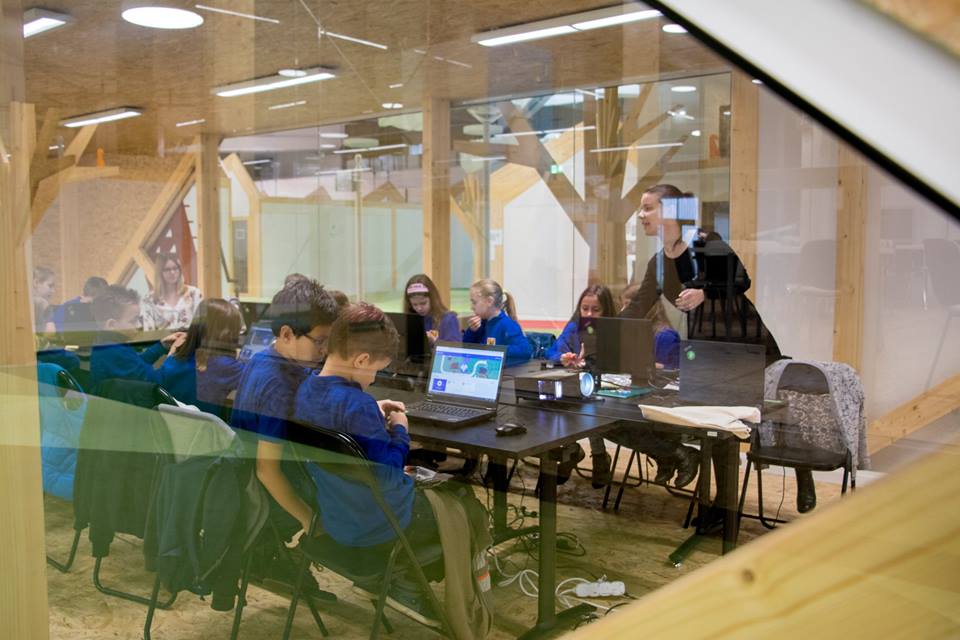
After the national STEM project, the micro:bit has established itself as a globally unique and leading computing platform, with national projects, for example in Denmark (for all 5th grade students, to introduce programming), Singapore and Canada.
As lower grade students rarely have a designated time to use computer labs, micro:bits will be placed in school libraries. In this way, teaching can take place in the library and in the classrooms. The library will allocate additional micro:bits for students to borrow for work at home, Bakic announced.
The project cost is estimated at 5 to 6 million kuna, and initial funding will be provided by IRIM and the Rotary Club Zagreb Center, each with 100,000 kuna, which will secure the purchase of the first micro:bits.

The project will be implemented for a period of 12 or 24 months, depending on the availability of funds and interest of the schools. It is possible to finance it in phases, so schools will receive micro:bits in waves, in the order that have signed up.
IRIM will also fund the development of content for lessons from various subjects, using micro-bits, just as it did for the 6th and 5th grade. Content will be permanently available and upgraded using various channels. IRIM will also educate 1000 - 3000 teachers, just like it previously trained two thousand teachers for the ProMikro project.
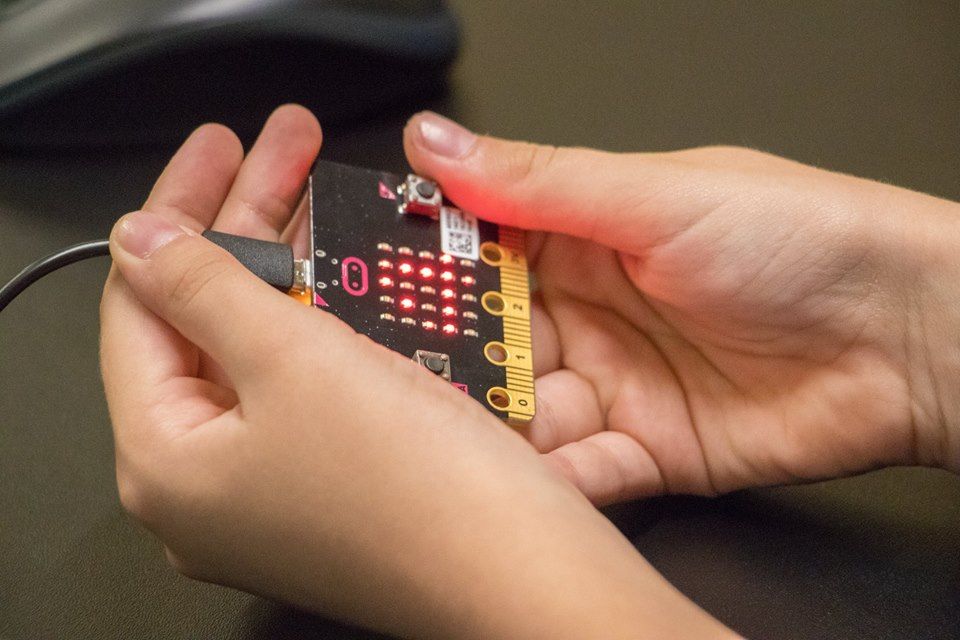
IRIM also provides web site production, collection of applications and communication with schools. Partner organisations joining are: the Croatian Post Office, which will donate the delivery of micro:bits throughout the country, the Bruketa & Žinić & Gray creative agency will supply its services in the project presentation, and the PR agency Communication Laboratory will give support for public relations. BBC micro:bit is an educational and creative tool whose purpose is to inspire a new generation of young people.
It can be used in a variety of ways throughout the curriculum, not just in STEM subjects (science, technology, engineering and mathematics). It can help young people acquire knowledge and skills to develop from digital technology consumers into designers and creators of new tools that will help them improve their learning, solve problems or simply entertain them and allow them to take full advantage of the benefits of life and economy in the 21st century.

Micro:bit is characterised by extremely low prices, low barriers for beginner and advanced use, and a highly rich ecosystem. Click here and here for examples.
The founders of the Micro Foundation are: the BBC, Microsoft, Amazon, Samsung, ARM, the British Council and others.
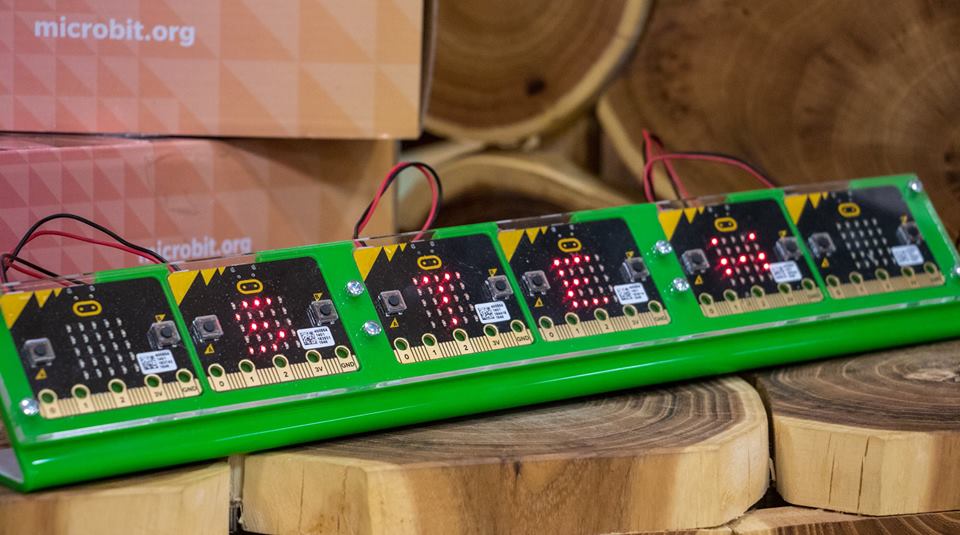
IRIM runs the Croatian Makers program, which includes a number of projects such as: the Croatian Makers Robotics League, STEM Revolution, ProMikro, Internet of Things, STEM Revolution continues - Libraries, STEM Car. Croatian Makers, with over 100,000 children, and over 3,000 educated teachers, is the largest program of its kind in the EU.
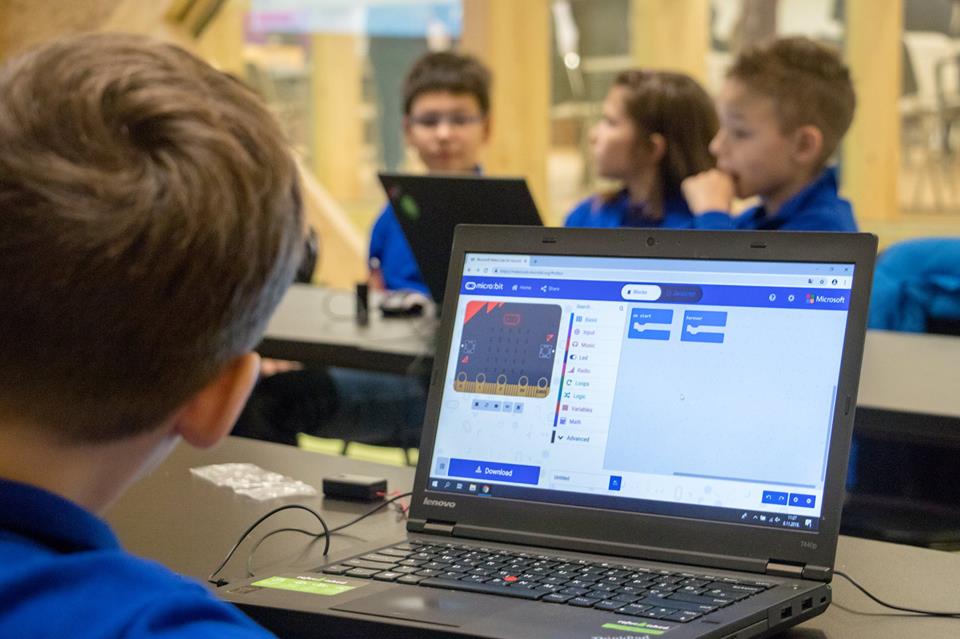
The founders of IRIM are Nenad and Rujana Bakic. You can find more information on Croatian Makers here. Participating schools can apply here.
Want to keep up with more information on the stem revolution in Croatian schools and more information like this? Make sure to follow our Made in Croatia page!
Unique Stonemasonry School on Brač Lures International Students
One unique school on this central Dalmatian island is of interest for students from across the continent.
10.5 Million Kuna for School Renovation in Koprivnica-Križevci County
Good news for students in Koprivnica-Križevci County!
Grants Available for Croatian Students in Trieste
All foreign students studying in Trieste, and there are very many of them, have the right to access grants.
Non-Refundable Funds for Equipment for Maritime Schools
Excellent news for the students of Croatia's maritime schools along the coast.
Discovery Made by Croatian Scientists Will Enter World's Textbooks
The subject is interdisciplinary research in which Croatian scientists have combined cell biology and genetics with theoretical physics and the most advanced techniques of microscopy.

